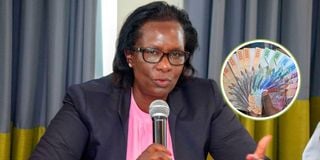
Salaries and Remuneration Commission (SRC) Chairperson Lyn Mengich.
Public servants have received an average pay increase of Sh946 per month over the last four years through salary reviews, collective bargaining negotiations, bonuses, benefits and allowances.
This pay rise averaged Sh11.27 billion every year translating to an average of Sh11,355 per year for each of the estimated 992,900 workers who are employed by the government.
It totaled Sh45.1 billion over the four-year period between the financial years 2020/21 and 2023/24, according to the Salaries and Remuneration Commission (SRC).
This is in addition to the automatic three percent pay increase that the public servants receive annually to help them cater for the increase in the cost of living.
During the same period, annual inflation has averaged 6.6 per cent, which is more than double the pay increase, according to the Kenya National Bureau of Statistics’ (KNBS) Economic Survey 2024.This means that the pay rise is not increasing quite as fast as the increase in the cost of living, making it harder for the vast majority of public workers to sustain a decent living.
“To cushion public officers against rise in cost of living, salary freeze notwithstanding, there has been an average 3 percent automatic annual increment in form of notch movement, within the advised salary structures up to the maximum salary points,” said SRC chairperson Lyn Mengich last week.
This comes even as questions continue to linger over the huge size of the public workforce amid productivity concerns.
The public wage bill has risen from Sh785 billion in financial year 2017/2018 to Sh1.035 trillion in financial year 2021/2022, according to the SRC.
The Commission has projected the wage bill to grow further to Sh1.17 trillion in financial year 2023/2024.
Ms Mengich said the approvals of Sh45.1 billion for pay rises, allowances and other benefits is way lower than the received requests for advice amounting to Sh150.89 billion over the four-year period.
“Without SRC’s advice, the country would have spent the entire amount of Sh150.89 billion between 2020/2021 to 2023/2024,” said Ms Mengich.
Teachers, who form the single largest group of public workers, are among the latest beneficiaries of a pay rise despite the State’s earlier insistence that it had no money to implement the CBA it had signed with the teachers’ unions.
The government effected a pay rise of between Sh1,000 and Sh3,000 to teachers effective last month after a month of delay. Some teachers have however termed the pay as “too little”, adding that the increment is not enough to meet their growing needs.
“Surely what can you do with Sh1,000? This is not even enough to cover the additional statutory deductions that we are paying,” said a Nyandarua-based teacher who requested anonymity.
Police officers were last month also been handed a salary increase of between Sh4,000 and Sh21,000. The pay rise was backdated to July. Head of Public Service Felix Koskei in July revealed that the pay rise for thousands of police officers would cost Sh1.3 billion.
But despite these increments, unions representing public workers have sharpened their knives in recent years to agitate for better pay which has forced the government to cede to some of their demands and sign Collective Bargaining Agreements (CBAs).
The increased pay for public servants has however been controversial for a few reasons. For instance, questions have been raised about the fact that the pay rise favours high earning State officials who get a better increment compared to their juniors whose pay only marginally rises.
Further, unions have raised concern that the pay rise is too little to enable government workers to survive the increasingly harsh economic conditions with runaway rise in the cost of living.
As a result, strikes and threats of strikes by unions over pay increment, salary delays among other grievances have persisted, dominating news headlines in recent weeks.
This has put the government in a tough spot because as it has effected pay rise for a section of public workers such as teachers and police officers, others have been left out, prompting them to threaten strikes.
On Wednesday last week, county workers, through their union Kenya County Government Workers Union (KCGWU), issued a 21-day strike notice to the 47 county secretaries over delayed pay rises.
The union’s Secretary-General Roba Duba said SRC had ignored a presidential directive that increased the pay of public servants by between 7-10 percent to cushion then from a high cost of living.
“We have had patience for the longest time as county workers. We have been begging for years. The last time salaries of county workers were reviewed was in 2012. This is discriminatory. We have reached a breaking point,” said Mr Duba.
A day later, unions representing health workers also issued a strike notice over numerous grievances.
The unions, among them the Kenya Medical Practitioners and Dentists Union (KMPDU) and the Kenya National Union of Nurses and Midwives (KNUNM), issued a 14-day strike notice to counties over salary delays, lack of comprehensive medical cover and non-remittance of statutory deductions.
A week earlier, KMPDU had threatened withdrawal of services by doctors should their concerns not be addressed.
“It is unacceptable that doctors who are at the forefront of saving lives have to endure months without pay. This situation is untenable and has left many of our members struggling to meet basic need,” said KMPDU Secretary-General Dr Davji Atellah.
Civil servants have also challenged the SRC’s decision to freeze pay increase in the financial year 2024/25 by moving to court, arguing that the move is a violation of their rights and the Constitution.
“Our members are low and middle level employees and hence any salary cut or delay in any manner is likely to financially affect them greatly in regard to their daily survival,” said Tom Odege, the Secretary-General of the Union of Kenya Civil Servants (UKCS).
On the other hand, however, analysts have warned of the impact of the annual pay increases on the public wage bill, which continues to eat up a significant chunk of the country’s revenues.
Bernard Muchere, an auditor with decades of experience in the public sector, says that the government is understaffed which has affected service delivery.
He says that while the government needs more workers, the huge public wage bill, which has been ballooned by ghost workers and diversion of funds to other uses but marked as wages has made hiring untenable.
“The growing wage bill is caused by ghost allowances and salaries and the diversion of wages allocations to other uses but accounted as wages. In real terms, the government is understaffed,” said Mr Muchere.








